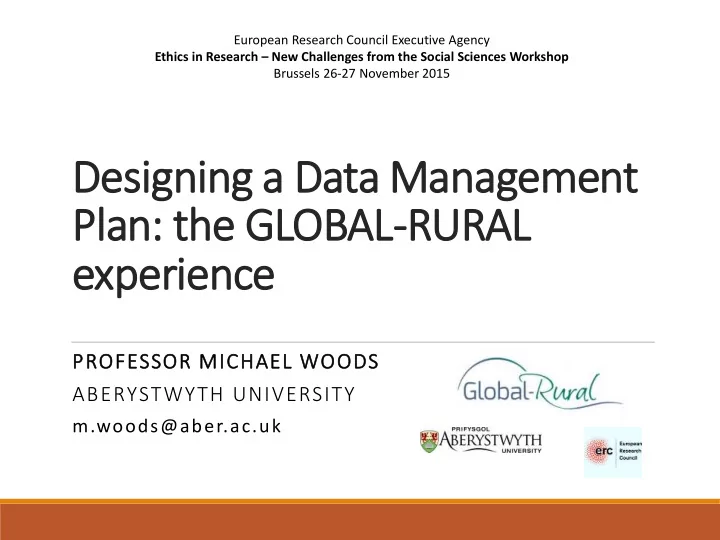

European Research Council Executive Agency Ethics in Research – New Challenges from the Social Sciences Workshop Brussels 26-27 November 2015 Designing a Data Management Plan: the GLOBAL-RURAL experience PROFESSOR MICHAEL WOODS ABERYSTWYTH UNIVERSITY m.woods@aber.ac.uk
GLOBAL-RURAL ERC Advanced Grant Sweden Wales Newfoundland 2014-2019 Hebei and Ireland Shandong Examining how globalization is Spain provinces reproduced through rural localities and how rural agents respond to Liberia Queensland Zambia opportunities and challenges Rio South Grande Africa 9-strong team led by Professor Michael do Sul North Island Woods at Aberystwyth University, UK Research across 4 work packages and case studies in 12 countries Mixed methods approach Website and blog: www.globalruralproject.wordpress.com
Types of Data Publicly available secondary quantitative data (e.g. census statistics) Commercially obtained secondary quantitative data Newly generated quantitative data (e.g. survey data) Interview data (recorded and transcribed) Interview data (not recorded) Focus group data Observational / ethnographic notes Archival data (historical documents, press articles etc) Visual data (photographs, video) Participant generated data (written, online etc)
Data Sensitivities Individual lifestyle data Commercially purchased data Individual life course data Data from semi-public spaces and forums Business data Third party data Information/opinion on controversial issues Georeferenced data Moving data internationally Data collected in non-democratic states
Context Data protection and privacy laws in UK and case study countries ERC policies University policies Research institute protocols Gatekeeper/partners’ policies Guarantees made to research participants Advice from ERC Ethics Advisor, University Ethics Advisor, University Data Protection Officer, Independent Ethics Advisor, colleagues and fellow researchers
Context Start of grant coincided with development of new Research Data Management policy by university
Resources https://dmponline.dcc.ac.uk/
Resources
Resources
Resources http://www.dcc.ac.uk/resources/data-management-plans
Resources http://www.dcc.ac.uk/resources/data-management-plans
Key Issues Data Collection What data will be collected? Primary and secondary qualitative and quantitative data Data collected primarily concerns organizations, relations, policies and events Specified where individual personal data would be collected How personal data might be used and conditions of use
Key Issues Data Collection How will data be collected? Data collected through interviews, archival and library research and field observation Some data collected through participatory methods, e.g. workshops, interactive walks, participatory GIS Participation by informed consent Specific consent obtained for photography involving individuals or on private property
Key Issues Data Collection How will data be recorded? Interviews and workshops digitally recorded, with participant’s consent, and professionally transcribed If consent for recording not given, manual notes will be taken Data recording in archives and libraries will follow institutional regulations and may involve photographing or scanning of documents and/or manual note- taking
Key Issues Data Transfer How will data be transferred from Interview recordings and notes the field site? containing personal or sensitive information will be stored during fieldwork in password protected or encrypted files on a laptop or tablet computer and backed-up on a password-protected pen-drive or external hard drive Transfer of interview recordings for transcription?
Key Issues Data Processing How will confidentiality and Personal data will be anonymized privacy be protected? or disguised as soon as possible after collection Use of pseudonyms Recording of appropriate metadata Good practice in naming files Delinking anonymized and non- anonymized data
Key Issues Data Storage Where will data be stored? Data, including interview transcripts and all associated documentation that could identify participants, will be stored on a secure drive on the departmental server Negotiation for appropriate secure driver space with university University policy required data to be stored on a server physically located in the EU
Key Issues Data Storage Who will have access? Members of the GLOBAL-RURAL team Subsequently modified with permissions at folder level How will data be backed-up? Automatic back-up on mirror server by university Additional back-up of some data on password protected or encrypted pcs and external hard disk drives
Key Issues Data Retention & Sharing What data will be retained? Anonymized processed data, for example in interview transcripts and databases. Transcripts and other data where effective anonymization is not possible will be with-held from archiving Encouraged to think more expansively by Independent Ethics Advisor
Key Issues Data Retention & Sharing Where will data be archived? UK Data Archive But – evolving environment. Other possibilities? Who will have access to archived Anonymized transcripts and other data? data will be made available for use by other researchers, except in cases where consent has been withheld by the participant
Key Issues Data Retention & Sharing What data will be destroyed and Raw data from which research when? participants may be identifiable, including recordings of interviews, field notes etc, will be retained for the duration of the project and no more than 12 months after the end These materials will be will destroyed no later than 12 months after the end of the project But – compliance with university policy?
Specific Issues Data from ‘non - conventional’ methods Includes participatory methods, participant generated data (e.g. uploads to websites, social media data etc Issues of consent, recording and anonymization, intellectual property and data ownership Data from work with schools Compliance with two sets of policy Procedures for informed consent Intellectual property and data sharing
Specific Issues GIS analysis and mapping of data Appropriate georeferencing Safeguards that locational data does not compromise anonymity Data from research in ICPC countries (Brazil, China, Liberia, South Africa and Zambia) Attention to local legal regulations and cultural sensitivities Advice and support from local partners Role of field assistants and interpreters Balancing security of data with local legal compliance Exported data not to include any personal data or data with sensitive commercial or political applications What data needs to be collected and what needs to be recorded?
Reflections Make use of tools and resources to support preparation of data management plans Take advice widely and particularly on technical issues Avoid compromising the potential of research for easy options Look for creative solutions A data management plan is an evolving framework A good data management plan can improve the research process and outcomes
Recommend
More recommend